Angela Ackerman's Blog: Writers Helping Writers, page 21
June 18, 2024
Top 10 Tips On Writing A Fantasy Novel
 What Makes Up Fantasy As A Genre?
What Makes Up Fantasy As A Genre?If you want to write a fantasy novel, it pays to understand what goes into this fascinating genre. Fantasy conventions can vary widely, but there are some common elements we can find. Here’s a few key conventions of fantasy novels that I learned writing my own … Ready? Let’s go!
1) MagicMagic can be a fundamental element of fantasy novels. It is often used by characters to achieve extraordinary feats or interact with the supernatural. One of the top things to remember here is to ensure your magic systems have limitations. If there are no constraints to your magic system, then this can impact the potential conflict of your story. This is where Brandon Sanderson’s 3 Laws For Magic Systems can really help.
2) Fantastic Creatures
Where there’s magic, there’s also monsters. But fantasy novels often feature mythical creatures that are not necessarily evil too. ��Dragons, elves, hobbits, witches, centaurs, unicorns, gigantic sea serpents, sandworms… they can be anything you like. The sky really is the limit!
3) Hero’s JourneyThe Hero’s Journey is a classic plotting archetype, charting a protagonist’s growth from ‘zero to hero’. Many fantasy stories follow the classic hero’s journey, where a protagonist embarks on an adventure, faces challenges, and ultimately undergoes personal growth. Such fantasy novels as Harry Potter, Dune and even my own, The Coven, follow this archetype.
4) StoryworldTraditional fantasy worlds are often inspired by medieval settings, featuring castles, knights, and kingdoms, creating a sense of timelessness and wonder. However, there’s such a thing as urban fantasy too that does the opposite. Instead of being ‘ye olde’, it might take place in our own world, with a secret underworld of magical people. In short, storyworld can be anything you want … as long as you start as you mean to go on!
5) Epic BattlesEpic battles between forces of good and evil are a common theme in fantasy. Such battles often showcasing bravery, sacrifice, and the triumph of good over evil. A good example here would be Marvel’s Avengers: Endgame which has a fantastic end battle that does all these things.
6) QuestsQuests can be a staple of fantasy literature. The Hero’s Journey (as per #3 on this list) is one large quest in which characters set out on a journey to accomplish a specific goal, facing obstacles and adversaries along the way.
7) Prophecy
Prophecies and foretold destinies play a significant role in many fantasy stories. These prophecies then shape the actions of characters and drive the plot forward. In The Coven, ‘The Proclamation of The Elementals’ starts the book:
“We are all kernels in the earth. We are baptised by fire; fed by the water of life, powered by air. To us, we call The One: connect us through the chain of being and bring us liberation from the ties that bind us.”
This prophecy tells of an all-powerful witch The Elementals call ‘The One’. In this storyworld, Elemental witches have the power of one of the four elements: air, water, fire or earth … but The One has ALL four elements. As the prophecy foretells, The One is powerful enough to free all witches around the world.
8) Parallel WorldsFantasy often explores the idea of parallel worlds or alternate realities. In The Coven the world is almost the same as ours … except that up to 50% of women have magic. The leaders of the world don’t like this one bit, especially the President of The United States, Michael Hopkins. He decrees that witches must be locked up for their own safety as well as non-magical peoples’.
I watched a lot of political rallies when I was writing The Coven. I really wanted to make the politics of my parallel world believable, but worried about Hopkins being too jingoistic. Yet every time I sent these scenes off to my editor or beta readers, it always came back with: ‘Still not as bad as the REAL guy!’ That was surprising.
9) Lore and MythologyFantasy worlds are rich in lore, mythology, and history, providing depth and context to the setting and characters. I am a big fan of ‘The Power of Three’ in writing. When things come in threes in literature, it’s believed they can be more satisfying, more effective and/or more memorable, than other numbers of things.
I enacted The Power of Three with my witches in The Coven. The ‘Triumvirate’ refers not only to witchcraft generally – Mother, Maiden, Crone – but also the witches themselves.
The vast majority are Kitchen Witches, who don’t have innate magic of their own. Instead they have spell books, cauldrons, poppets, family spells etc rather like our own reality.
Where it changes are the other two types of witches. About 5-8% of witches are Crystal Witches. They do have innate magic in their veins, but can only access it with crystals (as their names suggest). The remaining 2% are The Elemental witches (mentioned in #7).
10) Themes of Good vs. EvilFantasy frequently explores themes of morality, ethics, and the battle between light and darkness. Whilst the story may deal with UNreal settings, creatures, magic etc, it may be about very real issues. These UNreal things can offer insights into human nature and society. As The Sun newspaper said of The Coven: ‘A scarily real take on society today … buckle up for a battle like no other’.
Got any questions about writing fantasy? I’m very happy to answer … leave them in the comments and I will get back to you.
Good Luck With Your Own Fantasy Novels!The post Top 10 Tips On Writing A Fantasy Novel appeared first on WRITERS HELPING WRITERS��.
June 13, 2024
The Secret to Page-Turning Scene Endings

It���s easy to surmise that propelling readers from one scene to the next relies upon a dramatic closing hook, the evocative or provocative impression at the very end of the scene.
Seemed like everyone was finding someone to pair off with. So when was he going to find a girl of his own?
Or���
Edwina looked the poor sod straight in the eye. ���She���s not coming back, Edgar. Ever.���
But although hooks may tantalize, another underlying force is what truly launches readers into the next scene. This dynamic arises from the final step of scene structure: a new outcome���change.
Scenes are designed to move the story forward by creating incremental change at the plot or character levels. Effective scene structure intrinsically sets up a domino effect: The unexpected outcome of one scene sparks curiosity about how the character will cope in the next, kindling the impulse to turn the page.
This is how complete, fully formed scenes get readers itching to see how the seeds of change will grow.
Scenes Create ChangeLet���s review the structure of the two most common types of scenes in a novel:
Action Scenes�������������������� ���������������������������������������������� ������������������������������������ Reaction (���Sequel���) Scenes
Objective Emotion
Obstacle Deliberation
Outcome Decision
Action and reaction scenes share an important factor in common: Their final phases are all about generating change.
In an action scene, change occurs when something (the ���obstacle���) interrupts the viewpoint character���s progress toward their scene objective. This creates an unexpected outcome. Something unanticipated has just occurred, and the inevitable consequences loom just ahead.
One minute they were packed shoulder-to-shoulder in the muggy subway car. The next, the squealing of metal against metal sent the world sideways, and she was tumbling wildly into the dark subterranean depths.
In a reaction scene, the final decision phase reveals the viewpoint character���s change of heart or intentions or plans, telling readers to brace for consequences.
Gripping the zip-tie cuffs, Arjan squeezed his eyes shut against the thrumming pain in his skull. He could walk away from this life of deception and violence once and for all. Or he could seek his revenge.
A dramatic closing hook can focus and magnify this effect, using introspection, foreshadowing, or imagery to hint at the broader struggles, unresolved tensions, or profound transitions the scene has provoked. But that���s the thing���the scene itself should provoke those rumblings. When the scene clearly introduces change, even a glimmer of yearning or glint of optimism can ignite the spark that sets the next scenes into motion.
The Springboard EffectThe unanticipated outcome of each scene pushes the characters urgently into the next, riding the domino or baton-passing effect. Scenes shouldn���t be able to be shuffled about willy-nilly; plucking an effectively crafted scene out of the flow would break the chain of action and reaction that makes one scene lead directly into the next.
Readers rightfully expect the change created by one scene to be addressed promptly in the next. This propagates reader investment: hope or worry, anticipation or suspense.
For example, after a scene ending with Max vowing to leave Jonquil and return to his wife, readers will expect his next scene to begin addressing that tangle. He might be temporarily delayed by other concerns���a delicious way to add tension���but he shouldn���t blithely turn away without further thought. Didn���t that decision matter?
The domino effect of one scene tipping into and kicking off the next forges a chain of progressively escalating complications in the story. This chain is what writers are talking about when they refer to the rising action of a plot, the idea that the conflict (what does happen) and tension (what might happen) spiral to a peak at the climax. The first scene of the story sets off an unstoppable chain reaction, leading to a resolution that feels surprising in the way it happens yet inevitable by virtue of cause and effect.
Think of the scenes as opportunities to drop clues into the links of the story. This may seem like an obvious strategy for a mystery story, but you should exploit this effect in every genre. Scatter breadcrumbs or dangle questions at scene endings, then scoop them up promptly in the next scene, weaving the connective threads into a taut, vibrant storytelling tapestry.
Caveat 1: The RoadblockOccasionally, a scene might run up against a revelation or cascade of consequences that creates a roadblock with no apparent route forward. This sort of scene���full stop, no way forward���is difficult to pull off if you haven���t planned the story before writing it. When the options are so limited that the character can find no way forward, the plot cannot organically advance���the story is muzzled.
Having the character sit around and wait for a deus ex machina (an outside force to swoop in and solve the problem) frustrates readers, who want stories where the characters solve their problems, not the author. Instead, use a reaction scene to break the deadlock, as the character discovers something new within themselves���an inner breakthrough of some kind.
Some scenes do warrant a note of finality, as a story thread winds to completion. But finality and completion signal endings, and if your story isn���t over yet, you���ll want to maintain the plot���s momentum. Most scenes, especially those at the end of chapters, benefit from a dynamic of change to keep readers turning pages.
Caveat 2: Top Spin
Cliffhanger, edge-of-the-seat pacing frequently leverages a screenwriting technique called top spin. In top spin, the scene cuts off at the peak of tension, just as something interrupts the character���s progress toward their immediate agenda. The scene leaps from this interruption or obstacle directly to the next scene, with no opportunity to show reaction or outcome.
Think of the way TV shows cut off at a cliffhanger before a commercial break, then pick up afterwards in the same stream of action. That���s top spin in action. Top spin creates an extremely strong narrative drive.
���Done well, the drama is then built around confrontation/crisis in a sequence that never seems to stop moving,��� writes John Yorke in Into the Woods: A Five-Act Journey Into Story. ������ Every scene ends on a question���partly ���Where did that come from?��� but more importantly ���How are they going to get out of that?��� By cutting away at the crisis point, a writer thus creates a sequence in which question is followed by (delayed) answer, which is followed by a question once again. ��� The technique of ���come in late, get out early��� simply accelerates this process, forcing every scene to cut off at the ���worst point��� of a scene.���
A brilliant resource in suspense stories, copious amounts of top spin are better suited to the screen than the page. Unlike movies or TV, which can only watch a character from the outside, novels draw readers into the character���s thoughts and perspective. A book that consistently chops off character reactions as soon as scene reaches its peak circumvents this quality, and readers may decide that the book reads more like a screenplay than a novel they can sink into.
Harnessing the Force of ChangeContinuity between scenes depends on more than tacking on a provocative closing hook. The hand-off effect arises organically from scene structure, which generates a reversal or change for the viewpoint character. The allure of how the character will deal with this complication keeps readers turning pages long into the night.
Read more:Goal-driven action scene structure, the building block of stories
Strategies for smooth scene openings
The post The Secret to Page-Turning Scene Endings appeared first on WRITERS HELPING WRITERS��.
How to Fix Big Story Problems
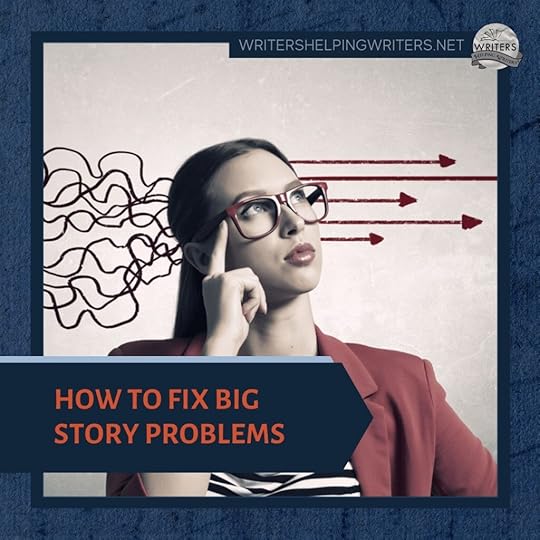
Is there anything more frustrating than knowing there’s a problem with our story, but not being sure how to fix it?
We wish for an easy button in these moments, but sadly, none exist. Occasionally though, we get lucky and discover a versatile story element or technique so useful it can help us navigate past MANY story problems!
So, storytellers…ready to meet your new best friend?
The All-Powerful Emotion AmplifierEmotion amplifiers are unique states or conditions that act as a challenge, conflict, and emotional destabilizer all rolled into one. They generate internal strain and emotional volatility which can lead to a loss of control, sending your character on a crash course with missteps and mistakes!

Sounds bad, right? Well, it is…for the character. But for your story, it’s great!
Let���s look at a specific amplifier: scrutiny.
Scrutiny: being observed or critically examined.
Now, imagine yourself for a moment, will you?
You’re merrily typing away on your computer, drafting your latest story. Your brain is full of ideas! The words are flowing! And then your mother-in-law appears and begins reading over your shoulder.
Or:
You���re hosting the family barbeque and your sister-in-law arrives, sits at a picnic table, and proceeds to scowl at everything in view. She examines your cutlery as if it has never seen a dishwasher, smells the potato salad before adding it to her plate, and makes a show of picking off the burned bits of her chicken.
 Can you hear the lambs screaming, Clarisse?
Can you hear the lambs screaming, Clarisse?Face it, scrutiny is not fun. Whether it’s you, me, or a character, it gets in our heads, makes us hyperaware of our flaws, and whatever task we’re working on instantly becomes harder.
Even if an observer is expected–say at a competition–a person will have to have a strong mental focus not to be thrown off their game. So, you can imagine how our character, grappling with the weight of story problems, responsibilities, and emotional struggles, might react if we added scrutiny to the mix. You can just see how it would become that one burden too much, and in their frustration, they’d lash out or do something else that would take their situation from bad to worse.
Pain, exhaustion, hunger, competition, danger, attraction���amplifiers come in all shapes and sizes, and can help with story problems when used strategically.
Common Story ProblemsNOT ENOUGH CONFLICT:
An amplifier is an added challenge to navigate that, when intense enough, will cause our characters to lose control. When they do, they act on emotion, not thought, and this has repercussions: poor decisions that lead to mistakes, choices that carry unforeseen consequences, and new complications they didn’t think about in the heat of the moment. In other words, conflict!
LOW STAKES:
When there’s not enough on the line, readers tune out. One of the best ways to raise the stakes is to make things more personal. Imagine your character poorly navigating an amplifier like danger, competition, or intoxication and making a mistake that hurts someone or puts an important goal at risk. When a character screws up and feels responsible, fixing the situation to undo the harm they did becomes a personal mission. Readers will tune in because 1) they can’t help but empathize over making a costly mistake and 2) they feel tension knowing the character can���t afford to fail or lose control again.
PASSIVE CHARACTERS (NO AGENCY):
Readers are drawn to characters with agency, those who steer their fate and take charge, not ones who let others solve their problems. Emotion amplifiers can help passive characters step up because they inflict urgency, motivating the character to find relief from the strain it causes.
A starving character must find food (Hunger), a character lost in the woods must find their way to safety (Physical Disorientation), and a character suffering from Sleep Deprivation must secure rest before their body gives in.
LOW TENSION:
Tension, that stretchy feeling that comes when a person is unsure what will happen next, is something we want to build into every page. Because amplifiers cause characters to be emotionally unstable, readers feel tension as they read on to see if the character can handle the strain because if they can’t, it will cost them.
HIDDEN EMOTION:

In many situations, characters will hide what they feel because they don’t want to be judged, feel vulnerable, or be viewed as weak. Unfortunately, this makes it harder for readers to get close enough to know what’s going on behind their stony exterior, and feel empathy for what the character is experiencing.
This is why amplifiers are great to deploy. Like a boiling kettle, adding a nice dollop of pain, pressure, exhaustion, or even arousal, and suddenly those repressed feelings bubble up and spill out, putting the very emotions they’re hiding on display!
SHOWING CHARACTER GROWTH:
How well (or poorly) a character responds to problems and stressors can say a lot about them, and reveal how much growth is required for them to achieve their goal. Emotion amplifiers are many things, including tests. If the character handles an amplifier poorly, they face the fallout and deal with the consequences. But it also teaches them what not to do next time, so if you later hit them with the same (or similar) amplifier again and they handle it better, it is a neon sign to readers that the character is evolving.
PERFECT CHARACTERS:
Perfect characters are a turn-off because they don’t feel realistic. Readers are drawn to characters who are true to life, meaning they’ll lose their cool, have bad judgment, and screw things up at times. You can show all this through the poor handling of an emotion amplifier! Characters who don’t handle stress and pressure will feel more authentic, because readers have had their own struggles in that department and know what it’s like. Seeing characters in the same situation is relatable, and makes it easier to cheer them on as they work through the complications in the aftermath.
UNCLEAR MOTIVATION:
In every scene, readers should know the character���s goal and why they are pursuing it. If you need to redirect and show a clear scene goal, amplifiers can help. Whatever it is–pain, stress, pressure, dehydration–it’s causing a form of strain, meaning your character’s goal will be to manage it or free themselves from it.
HAPPY CHARACTERS IN A HAPPY LAND:
Like low-conflict situations, we also don���t want characters to be happy for too long. From time to time, your character will come out on top, ending a scene in a win. An emotion amplifier like an injury, illness, or exhaustion is a great way to give them a new situational problem to focus on.
LACK OF RELATIONSHIP FRICTION:
Stories where everyone gets along and supports one another can elicit yawns from readers. People rub against one another, and it’s not always a bad thing. Sometimes this needs to happen for important realizations to take place for a character to examine boundaries, and expectations, or achieve personal growth.
An amplifier can bring forth friction because if a character mishandles the strain of it, they may lash out, question loyalty or motivations, shut people out, or do other things that will cause misunderstandings. Any damage they do to the relationship will need to be undone, giving the character a chance to see things from the perspective of the one they hurt, and to practice accountability, both of which can strengthen the relationship long-term.
PREDICTABILITY:

Some stories can become predictable if certain plot elements, character types, and other genre expectations strain a writer’s ability to be creative. Emotion Amplifiers come in all sizes and shapes, meaning choosing the right one can easily transform a premise, conflict scenario, or relationship dynamics, elevating it into something fresh. For example, wouldn’t it be great to see a pro-athlete character struggling with sensory overload when he hits it big, a love interest trying to manage her compulsions, or a pregnant police detective hunting down serial killers?
LOW READER ENGAGEMENT:
If an agent, editor, or beta reader has even mentioned that they struggled to connect with your character, chances are two things have happened. One, the character���s emotions are not accessible enough to the reader, meaning they are too well hidden or repressed, or two, there isn���t enough common ground between the reader and your character for empathy to form.
Emotion Amplifiers help with both, bringing emotions to the surface through volatility and by representing a common ground experience readers can bond with characters over.
All readers know what it is like to feel internal strain and, if they give in to it, make mistakes they’ll regret. They empathize with characters having to do the hard work of fixing what they’ve broken. Should the character successfully stay in control of their emotional responses despite the strain an amplifier causes, readers rejoice with the character for mastering the moment and rising above their stress and struggle. Win-win!

If you���ve not yet dove into the wonderful world of emotion amplifiers, I hope you’ll change that. Start by reading this introductory post, checking out this list of amplifiers, and then seeing if The Emotion Amplifier Thesaurus: A Writer���s Guide to Character Stress and Volatility is the life preserver your story needs.
The post How to Fix Big Story Problems appeared first on WRITERS HELPING WRITERS��.
June 11, 2024
Flashbacks vs. Dual Timeline: What���s the Difference?
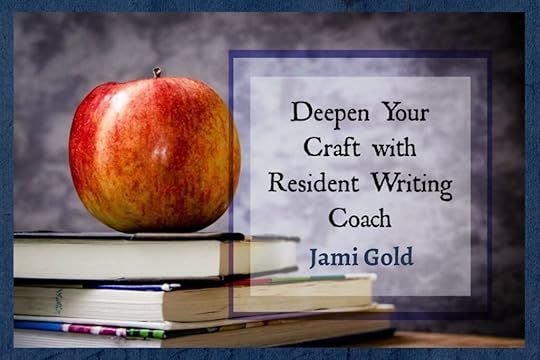
For strong storytelling, we need to focus on what���s important and relevant to current story events. That means we shouldn���t info-dump a bunch of irrelevant backstory just because it���s interesting or it���s something we enjoyed developing about our character, as we instead need to keep this story moving forward.
Yet two advanced writing techniques may seem to go against this advice by focusing on showing readers events in the past: flashbacks and dual timeline stories. What are these techniques, when might it make sense to use them, and what���s the difference between flashbacks and dual timelines?
Backstory 101: Use When NecessaryWhile we do need to be careful with backstory (due to potentially causing pacing issues, etc.), in most stories, it���s essential to include at least some pre-story information. Well-crafted backstory gives readers the context of a character���s issues (like a backstory wound) and emotions, informing readers about what makes the character tick. Backstory often creates a character���s pain and motivation���helping readers comprehend the why.
That said, our goal shouldn���t simply be to include backstory whenever we think readers ���need��� information. Instead, the most important advice for integrating any style of backstory is that the information must be relevant to the current story events and readers��� understanding of the story.
In general, backstory should be shared:
only when readers need the context for understanding a character���s current choices and emotions (that why information), such as when their actions or behaviors seem out of character or confusing ��� and ���only when that technique is the best way to have readers understand why the character is doing what they���re doing.Advanced Backstory: Flashbacks vs. Dual TimelinesNormal Backstory:In normal usage, we may allude to backstory in just a phrase or paragraph. Rather than spelling out the details of a character���s history, we may include just a hint, just enough for readers to understand.
For the first time in years, she prioritized her needs over those of her coworker.
That opening 6-word phrase is enough to allude to a past that���s held this character back from standing up for herself. Over the course of the story, readers can get similar hints if necessary to better understand her backstory wound and thus fully understand the story���s stakes and obstacles and her choices and motivations.
Backstory through Flashbacks:
However, sometimes it���s necessary to give readers more information. Maybe during this scene, readers need to know why this is the first time she���s willing to set boundaries. Maybe they need to see for themselves what happened in the past to understand why she was so traumatized and stuck in her mindset���and thus get the importance of this scene.
In that case, rather than contriving a way to share the information within the current story, such as having the character tell someone else about the past event, we may decide to show readers the event itself in a flashback. A flashback gives us a few paragraphs���up to a full scene���to show (rather than tell) a past event.
As her coworker prattled on about yet another emergency that he���d caused���and that required her to give up her weekend off to fix, for the twelfth weekend in a row���she remembered all the hundreds of other times she���d sacrificed for others at her expense. At the front of her mind was the teenage memory of her father demanding that she spend their entire Disney World family vacation watching her infant brother.
Some of the time, sure. All of the time?
At the announcement, she had stared into her parents��� faces, watching for a hint of a wink or smile. They were joking, surely. Her heart dropped as the reality sank into thoughts. No castle, no rides, no fun.
No way.
���But that���s not fair!������
Many books consist of multiple stories that interrelate to create one story, such as romance stories that feature both love interests or any story with multiple protagonists. For those, we may alternate scenes or chapters between the characters.
However, what if those stories happen at different times? As an example, what if the story we���ve been using above is a case of generational issues? What if we want to explore not only this woman���s story of learning to set boundaries, but we also want to explore her mother���s history of failing to do the same until she���s inspired by her daughter���s growth?
In that case, a dual-timeline story may make the most sense. With just flashbacks, we���d struggle to create an understanding of not only this woman���s history but also her mother���s story of past situations and choices. Instead, we could create dual stories set at different times so that both timelines are fully shown and not told.
A dual-timeline story gives us any number of scenes necessary to tell a complete story that happened in the past that is somehow relevant to the ���present��� story. Like any multiple protagonist story, we could alternate chapters or sections, one set in the ���present��� and one set at the earlier time (but still worded in our usual verb tense).
For our example, we may alternate chapters with the mother and daughter facing similar challenges in asserting themselves. The story set in the past may seemingly end with the mother giving up. Then soon after the daughter finds her backbone in the present, the mother���s story may resume by jumping forward in time to show her inspired to the same, finally leaving her abusive husband.
This time jump at the end is not necessary (or even particularly common) in dual-timeline stories (and in fact, it���s possible to feature the same protagonist in both timelines), but this structure fits with this example. Either way, the dual-timeline story comes together in the end, at least on a thematic level, to illuminate a single story idea.
How Is a Dual-Timeline Story Different from Using Multiple Flashbacks?
Depending on the story we���re trying to tell, the story arc set in the past of a dual-timeline story may also inform the ���present��� story the same way that any type of backstory provides context to readers. For our example, the alternating chapters could echo each other with similar challenges or show the daughter learning unhelpful coping habits from her mother, explaining more about why she is the way she is.
However, it���s important to understand that a dual-timeline story is not the same as a story with a bunch of flashbacks.
Multiple Flashbacks:Only need to be related to current story eventsCan be���but don���t need to be���related to each otherAre triggered by events in the current story, not the previous flashbackDon���t need to tell a story in wholeAren���t leading up to their own dark moment or climaxIn other words, the flashbacks aren���t there to work together to tell a separate story from the present story. Instead, the flashback scenes exist solely to illuminate the current story.
Dual Timelines:Each should have their own obstacles and stakes.Each should progress as a complete story, with their own independent structure of acts and turning points (dark moment, climax), etc.Each scene set in the past should follow the cause-and-effect chain of the previous past scene, not the preceding present-story chain.In other words, even if we cut out every present-setting scene, the story set in the past should still make sense and be a complete story. The past-timeline story exists for its own reasons, and the dual-timeline structure simply allows the two stories to add meaning to each other.
Need More Understanding or Examples of
Flashbacks vs. Dual-Timelines?
Check out Jami���s companion post!
If we need readers to know aspects of the past to understand the context of the present, our default should be to use our normal backstory techniques, including hints/phrases, characters sharing stories, etc.
Use Normal Backstory to share tidbits of necessary context relevant to current story events with readers.If we want to use our usual showing techniques to share a specific past event with readers, such as to create a deep point of view (POV) experience, we may want to use a flashback.
Use Flashbacks to show a past defining moment(s), event(s), or scene(s) with the POV character to readers.If we want to explore a story idea that integrates the experiences of two different timelines to create a single understanding, we may want to use a dual timeline.
Use Dual Timelines to show two stories set at different times that work together to illuminate each other.Final Thoughts about Backstory TechniquesWith the right writing techniques, we can ensure our backstory elements don���t slow down or interrupt our current story or feel like information dumps to readers. At the same time, appropriate use of backstory techniques can make our story and characters���and our readers��� connection to those���stronger and more compelling. *smile*
Want to learn how the new Fallout TV series juggles both flashbacks and dual timelines? Visit my companion post!
Have you struggled to understand how to weave backstory information into your story? Have you used flashbacks or written a dual-timeline story and have other insights to share? Do you have any questions about these techniques or how to approach backstory, flashbacks, or dual-timeline stories?
The post Flashbacks vs. Dual Timeline: What���s the Difference? appeared first on WRITERS HELPING WRITERS��.
June 6, 2024
Top Tips to Help You Get Great Author Photos
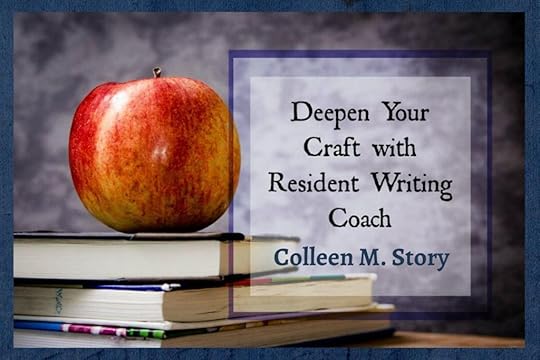
If you���ve never had professional author photos taken���or if it���s been ten years or more since you have���it���s time to do it now!
We live in a visual world. Readers want to see and connect with the author. When you invest in professional photos, you are likely to feel confident about sharing your photo wherever you need to.
Updating Your Author Photos: It���s About Who You Are
I got my first professional author photos taken about 11 years ago. I have used those photos so much! I was surprised at how often I was pulling from my ���author photo��� folder. It made it clear to me that it’s worth it to invest in this important tool for your author platform.
We authors often feel uncomfortable with author photos. Many of us would prefer to hide behind caricatures or simply avoid photos altogether. But today���s reader is more demanding. They are visual and used to seeing photos. If you don���t have one���or if you use some other alternative���it looks like you���re hiding, and readers will have a harder time relating to you.
You can help yourself feel more confident by getting professional photos, as they are likely to show you at your best.
Several weeks ago, I got my photos taken again. After a decade, I look different, and I didn���t want my photo to be a lot different from who I am in person.
I was afraid I wouldn���t like my new author photos. More wrinkles! Sagging! Ack! But I was surprised to find that I prefer them.
These more recent photos reflect the person I am now. I look at them and think, Yes, that���s me. The older photos, much as I have liked them, seem distant to me now���I���m not that person anymore.
Even if you���re concerned that you won���t like your new photos, I urge you to make that appointment. You may be surprised!
5 Tips to Help You Get Great Author Photos1. Find a Good PhotographerThe right professional photographer can make all the difference in your author photos. Yes, today���s cell phones have better cameras than ever. But that���s not all that it takes to get a good photo.
Today���s photographers are more affordable than you may think. I paid less this time around than last time, and it���s 11 years later!
Check their portfolio first. Look at lighting, locations, and creativity. Once you���ve narrowed it down to your top three, call them and talk to them. Email isn���t good enough. You want to feel like this person knows what they���re doing, and like you will feel comfortable working with them.
2. Choose Your OutfitsMost photographers allow you to use 2-4 outfits in your photo session. I highly recommend you go with at least three. This will give you a variety of photos to use in your branding and increase the odds that you will be happy with at least some of the final photos.
Set out the outfits you���re thinking of using���at least 5-10. Take selfies in each one, then send those to a trusted friend for input. Some of those outfits I thought would look best on me turned out not to be the final outfits I ended up going with.
Look for something that looks good on you. Colors are critical. Choose those that light up your face. The wrong colors can kill a photo shoot!
3. Check Your Hair and MakeupMake sure your hair looks as you want it to before the photo shoot. This isn���t the time for drastic changes. Go with a style that flatters your face. If you need a trim or color, do it a couple of weeks beforehand. Don���t wait until the day before. Give your hair time to settle in.
It���s likely your makeup will need to be different than it was 10 years ago. Don���t hesitate to go to a makeup counter for help if you need to. And don���t go too heavy���makeup that naturally accentuates your features is best.
4. Be Rested and CalmNothing messes up a nice photo like fatigue. Schedule your photo shoot at a time when you���re likely to be relaxed (not right after a big event). In the days beforehand, get enough rest, eat well, and exercise. Take care of yourself���it will show in your photos.
On the day of your appointment, block out some time. You don���t want to feel stressed or like you���re running late. You need time to prepare your outfits, get ready, and feel relaxed before you go.
5. Take Your Time Choosing the PhotosOnce the photo shoot is done, your photographer will likely email you a “roll” of the raw, unedited images. This is your chance to go through and choose your final photos.
Most photographers include a certain number of images with the photo session. (Mine included 15.) Be sure to check beforehand so you know how they manage this. You can usually get extras for an additional fee.
I’d suggest you take screenshots of those you like (usually photographers prohibit downloading initially), put them in a file, and let them sit overnight. The next day, look at them again and eliminate those you don’t like as much.
Ask one to three other people to weigh in. It helps to get outside opinions, but you don���t want too many. Opinions are subjective, and too many can be confusing. Choose a select few people whose opinions you value and see what they think.
Through a gradual elimination process, a few photos will rise to the top as those you want to use in your author branding.
Use Your New Photos!
Once you have your new photos, update everything. That includes your website, social media channels, and any new books you���re putting out.
My photo shoot coordinated with the release of my new historical fantasy, The Curse of King Midas. That was on purpose, of course! I dropped my selection in the back right before it went to print, and I���ve been in the process of updating everything else since then.
Don���t hesitate to invest in yourself this way. You���re an author���it���s okay to look like one. 
Note: Get a free inside peek at The Curse of King Midas here, along with stories from Colleen���s writing life.
The post Top Tips to Help You Get Great Author Photos appeared first on WRITERS HELPING WRITERS��.
June 4, 2024
How to Avoid Clich��d Emotional Reactions

The single tear trickling down the cheek.
A kiss that leaves one���s knees weak.
The grin that stretches from ear to ear.
Yawn
Oh, excuse me. I almost fell asleep there.
Why Readers Hate Clich��d Emotional Responses
Clich��s in writing are frowned upon because they���re easy; they���re the sign of a writer who chooses to go with the first idea that comes to mind rather than digging deeper to find the exact phrase to suit the character and scene. They don���t contribute to a unique authorial voice or say anything about who the character is as an individual. Clich��d emotional responses are particularly yawn-worthy because they literally could apply to anyone.
Readers come to each story with different purposes���to be entertained, informed, or to escape the real world, just to name a few. But regardless of why they open up a book, they all have something in common: readers all want to be engaged, to lose themselves in the story world. And the best way to make that happen is to get them feeling as they���re reading.
Consider the stories you���ve read that were thoroughly engrossing, that you couldn���t put down. My bet is that your emotions were engaged along with the character���s. When she was in danger, your own heartbeat increased. When she experienced insecurity, you felt that twinge of uncertainty in your gut. Your spirits lightened just a bit at the moment of revelation, when she finally recognized the changes she had to make to achieve her goal.
When our character���s feelings are clear and logical, they trigger the reader���s emotions, making it harder for them to put the book down. Character emotion is, in my opinion, the most effective and longest lasting hook in our bag of tricks, so it���s imperative that we get it right in our stories. And clich��s that we���ve seen a million times or overuse in our own writing just don���t get the job done.
Each character, like each person, is unique, so their emotional responses should make sense for them individually. Here���s how you can make sure that happens in your story.
Study People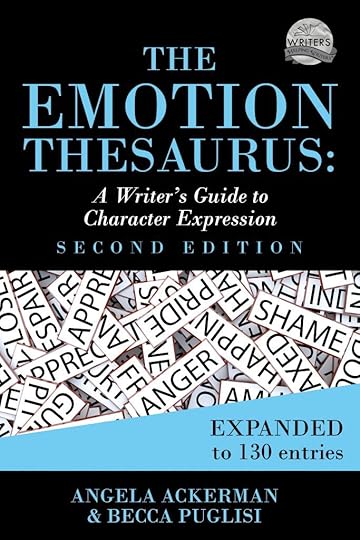
Emotional clich��s are common because we���re so familiar with them; we���ve seen and heard them a million times. To move past them and expand your emotional vocabulary, you just need more ideas for how various feelings can be expressed. This is why Angela and I started The Emotion Thesaurus, so we���d have more ideas to fall back on. Here are some of our favorite ways to gather that emotional data.
Watch Other People. What do the kids at the park do when they���re excited? What���s happening to that woman���s body when she���s annoyed? What���s going on with her face, her hands, her shoulders, her posture? Watching others can be tricky because you don���t want to be creepy about it. But good writers are often a little nosy. Hone those observation skills and notice what happens with other people when they���re experiencing certain emotions.
Better yet, Start with Yourself. Think about what physically happens when an emotion comes on. Take note specifically of the internal reactions, since you can���t study those in other people. What���s happening in your gut, in your muscles, to your pulse and breathing? Where does your mind go?
Analyze Books and Movies. Actors have to convey a character���s emotions believably; it���s what they get paid to do. So movies and TV shows can be a great resource. They���re also easy because we can rewind them or pause to make notes. Yes, literal notes. When you���re watching a movie or reading a book and you see emotions being conveyed uniquely, get out the notepad or laptop and write those examples down. Then you can examine them later to see how the author or actor was able to express the emotion so clearly.
Studying the emotional reactions of others will give you more ideas so you won���t have to rely on the ones you tend to overuse. Then, when you���ve got a good list of brainstorming options, make your character���s response realistic by individualizing it. To do that, you���ll need to know a few things about him or her.
Know Your Character
Personality plays a huge part in how someone conveys emotion. A flamboyant person is going to respond differently than someone who is timid. Likewise, someone who is easygoing will have different reactions than a high-strung character. So it���s important to identify your character���s dominant traits, since they will dictate many of their emotional responses. For help identifying those, check out our downloadable Character Pyramid and Character Attribute Target Resource from our Tools and Worksheets page.
Another factor that plays into this has to do with emotional range. Picture it as a straight line, with RESERVED on one end and DEMONSTRATIVE on the other. On a normal day, when it comes to emotional responses, where does your character fall on this spectrum? Is she pegged at one end? Right in the middle? Leaning toward one side or the other?
The answer to this question will provide you with a baseline for how your character will react so you can write her consistently, enabling readers to become familiar with her responses. That baseline will also help readers see when something is ���off������say, if the character is hiding her true feelings, or when she has a big, overblown reaction to something trivial. Unexpected responses will act like red flags, letting the reader know that something important is going on and they need to pay attention.
A third thing you want to figure out for your character is whether she tends to fight, flee, or freeze in times of stress. These are the common psychological responses to real or perceived threats. Characters often feel vulnerable when their feelings are triggered, and their natural tendency in this area will determine their emotional response to some stimuli.
Use Dialogue
Every character talks and interacts with others in their own way. Volume, tone, timbre, speech patterns, dialect, word choices, and other elements will be specific to him or her. Nonverbal habits will be present as well, since body language always plays a part in our conversations. But these verbal and physical cues will shift with the character���s emotions. When it comes to dialogue, think about how her voice and speech will change when she���s angry, excited, or sad. Make note of those differences and apply them when the specific feeling hits, and the reader will be able to easily track the character���s emotions throughout the story.
To bring it all together, let���s take one situation and show how different characters might respond. Let���s say we have a teen-aged heroine who is being confronted with a subject she���d rather avoid. Below is Character A���s profile, followed by her personalized response to this scenario.
Character A: Dionne
Personality: Respectful, cautious, sneaky
Emotional Range: Reserved
Fight-Flight-Freeze Response: Flight
Emotional Dialogue Cues: Speech gets short and clipped; fidgety hands; doesn���t meet people���s gaze
���So how���d the party go?���
Dionne plastered on a smile and buried herself in her Instagram feed. ���Great.���
���See, I knew you���d have a good time. Who was there?���
Her mouth went dry, but she didn���t dare swallow, not with Dad watching her over his coffee mug. Despite the hour, his eyes were bright and searching, twin spotlights carving through the mocha-infused fog.
She shrugged. ���The usual.��� Nothing to see here. Move along.
���What about Trey? I ran into his mom at the office yesterday and she said he was going.���
���Um, yeah. He was there.��� She scrolled quicker, the images blurring by.
���He sounds like a good kid. Maybe we could have him and his mom over for dinner.���
Her stomach lurched. ���Oh, I don���t know.��� Her phone trembled and she abandoned it, sitting on her hands to keep them still. ���We don���t really hang with the same crowd.���
Dad grabbed an apple from the bowl. ���Couldn���t hurt to branch out and get to know some new people.��� He slid into the chair across from her.
She stood up on legs that didn���t quite want to support her. ���Shoot, I just remembered. I have to finish my history paper. See you tonight?���
Halfway up the stairs, Dionne blew out a shaky breath. How could her dad be so smart at work and so stupid about people?
We see here how Dionne���s personality, emotional range, flight response, and dialogue habits all work together to paint a realistic response to a difficult situation. Now let���s look at the same scenario, but with a different character.
***
Character B: Beth
Personality: Bold, confrontational, impulsive
Emotional Range: More demonstrative than reserved
Fight-Flight-Freeze Response: Fight
Emotional Dialogue Cues: interrupts people; volume rises; defensive physical cues
���So how���d the party go?��� Dad asked, sliding into a chair at the table.
Beth looked up from her phone, her heart rate kicking up a notch. ���Fine.���
���See, I knew you���d have a good time. Who was there?���
She rolled her eyes. ���Sarah, Allegra, Jordan���you know, the usual.���
���What about Trey? I ran into his mom at the office yesterday and she said he was going.���
���I don���t know.��� She got up to dump her dishes in the sink, then leaned against the counter, arms crossed. ���Maybe? There were a lot of people there.���
Dad grabbed an apple from the bowl. ���He sounds like a good kid. Maybe we could have him and his mom over������
���Jeez, Dad!��� He quirked an eyebrow, so she lowered her voice even though she totally wasn���t yelling. ���Stop pushing. He���s not my type.���
���How do you know?��� He rubbed at a bruised spot on his apple. ���Couldn���t hurt to branch out������
���He���s not my type, okay?��� She barked out a laugh. ���I literally could NOT be less interested.��� Especially after last night.
He stared at her, so she glared back at him until he sighed and held up his hands in surrender. ���Point taken. I won���t bring it up again.��� He kissed her on the top of the head on his way out. ���See you tonight.���
He was halfway up the stairs before Beth blew out a shaky breath. How could her dad be so smart at work and so stupid about people?
***
Same situation. Two different reactions. This is how you take your character���s emotional responses to the next level. By spending a little extra time on the front end to get to know who your character is, it���s much easier to personalize their reactions. The end result will be characters that ring true for readers, who are then willing to participate in an emotional journey that carries them further into your story.
The post How to Avoid Clich��d Emotional Reactions appeared first on WRITERS HELPING WRITERS��.
May 30, 2024
Structuring an Ensemble Cast with Plotlines
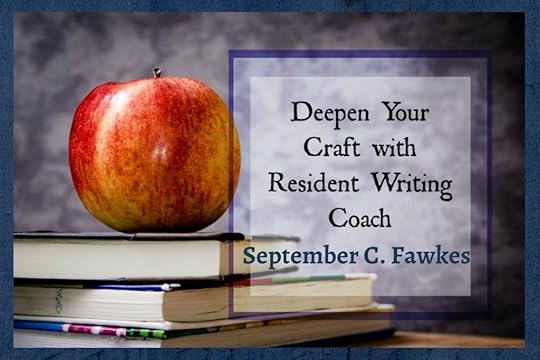
Writing an ensemble cast can feel daunting, especially when most writing advice is for stories that feature one, or maybe two, lead characters. How is an author supposed to structure a novel or series that has four, five, or six? One of the most useful approaches, is to consider plotlines.
Years ago, I did a post on the different types of plotlines in stories: external, internal, relationship, society/world, influence character, and undercurrent. I mentioned that most stories benefit from having at least three different types, because this creates dimension.
By far, the most popular combination is external, internal, and relationship. And usually, the protagonist is the lead of all three. However, this isn���t the only option. You could have external, relationship, and society, for example. And the same character may not always be the lead. Plus, once you have three different types, you can add more���more of the same or other types.
With these principles in mind, there are two main ways to approach ensembles.
Sets of PlotlinesIn the first approach, you create sets of plotlines. The Lord of the Rings is a great example of this (particularly in the films).

We have Frodo, a lead, with his own set. He has an external journey of taking the Ring to Mount Doom, an internal journey of his struggle with the Ring, and a relationship journey with Samwise.
Then we also have Aragorn, another lead with his own set. Aragorn has an external journey with the war, an internal journey over taking his place as king, and a relationship journey with Arwen (and arguably Eowyn).
The Fellowship also breaks down into more plotlines. Merry and Pippin have their own external, internal, and relationship journeys (though to a lesser degree), and so does Gimli.
Eowyn, Arwen, and Smeagol are other notable characters who get their own personal journeys.
Every character, though, is ultimately connected into the world/society plotline with the war against Sauron���they are each influencing or being influenced by it. So this is the glue that holds the sets together.
Admittedly, not every character mentioned here gets three plotlines, but that���s okay, because you only need three different types in the story, not three types for every key character. Speaking of which . . .
Splitting a SetIn the second approach, you start by having different characters share the three dominating plotlines, then go from there.
So in contrast to The Lord of the Rings, where Frodo and Aragorn get their own full set, in Umbrella Academy the dominating set gets split.
In season one, the dominating plotlines are external, internal, and relationship, but they are split between characters.
Five holds the main external plotline. He is trying to stop the apocalypse from happening by unraveling the mystery of what started it. He does not have strong internal or relationship plotlines.
Instead, Vanya holds the main internal plotline (as well as a big relationship plotline). She���s struggling to come to terms with the fact she has powers.
Allison holds another major relationship plotline, with Vanya.
There are other plotlines too, but those are the ones that impact the story the most, and they are split up.
From there you can add more, similar to Lord of the Rings. In Umbrella Academy, we also have Luther coping with the fact he wasted years on the moon (internal) and has feelings for Allison (relationship). Diego loses Patch (relationship) and wants revenge on Hazel and Cha Cha (external). Klaus is trying to get sober (internal) in order to connect with Dave (relationship). Vanya also has a minor external plotline about performing as a violinist. And Hazel and Cha Cha are trying to kill Five (external), but Hazel has doubts about the job (internal) and is developing feelings for the lady at the donut shop (relationship).
Above all this, there is a society/world plotline with those involved in the bureau.
But the glue that ultimately holds everything together, is Five���s quest to stop the apocalypse (the dominating external plotline). Every character influences or is influenced by that.
Typically with ensembles, the trick is that the characters and their plotlines have to somehow be connected to or influencing each other.

However, on the rare occasion that they are not, then often the glue is the theme. You could technically write a story where the characters never cross paths, nor fit into a greater plotline, but they each have a journey about the same theme topic ( . . . which may be a subject for another post).
In any case, if you are writing a long epic, like The Lord of the Rings, you will have more space to build out more plotlines for more characters. If you are working with a shorter story, you may want to split three or four dominating plotlines between leads, and keep any other plotlines minor, like The Umbrella Academy. The less important the plotline, the less it needs to be on the page.
With these approaches, you should be off to a great start in structuring your ensemble story.
The post Structuring an Ensemble Cast with Plotlines appeared first on WRITERS HELPING WRITERS��.
May 28, 2024
Using the 5 Elements of Writing to Immerse Readers

Have you ever watched a movie based on a book you read and realized the book is so much better? As a writer, this phenomenon excites me, because we can create an experience for readers with words that studios are desperate to replicate with their huge budgets. But how can that be? Will books become obsolete as more and more content streams into homes? I highly doubt it. Writers have a few tricks up their sleeves that movies can���t use. And if you combine these elements on your pages, you���ll create an immersive experience that all the money in the world can���t put on the screen.
Movies rely on 3 elements of writing in their scripts to tell their stories ��� Setting, Dialogue, and Actions.
They can also use music, lighting, and special effects to enhance the whole experience.
Writers have 2 extra elements at their disposal ��� Reactions, and Inner Thoughts.
(Strictly speaking, movies can try to replicate Inner Thoughts by using an actor���s voiceover, but that gets annoying quickly if overused ��� advantage, writers!)
That���s right, only in books can a reader climb into a character���s skin and experience their world through their eyes. This is why books aren���t going anywhere, and why many times, the book is better than the movie!
The 5 Elements of Writing Include
Element 1: Setting ��� Your world is alive in your head as you write. Make sure that you���re giving your reader some hints along the way to help them construct your beautiful world in their minds. Try sprinkling 2-3 details of your world by letting your characters interact with your setting at the top of each scene, or immediately after the characters arrive at a new destination within a scene to make your setting pop.
Element 2: Dialogue ��� Just like a movie director, you as the writer can decide when to zoom way out and let time pass quickly for your characters, sharing only summary details like a movie montage, or zoom right in close and hear everything that they have to say. Dialogue is a great tool to include when you���re zooming in, letting us hear the actual words that characters say to one another. Dialogue in books is trickier to punctuate than you think, and many writers get this wrong, consistently. Check out my dialogue punctuation cheat sheet that should clear up any questions you have and get you punctuating dialogue like a pro, once and for all.
Element 3: Actions ��� This element includes describing all the stuff that characters get up to in your book. These actions can be small, such as scratching a nose during a conversation, or huge, such as jumping in front of a moving train to save their nemesis and furthering your plot.
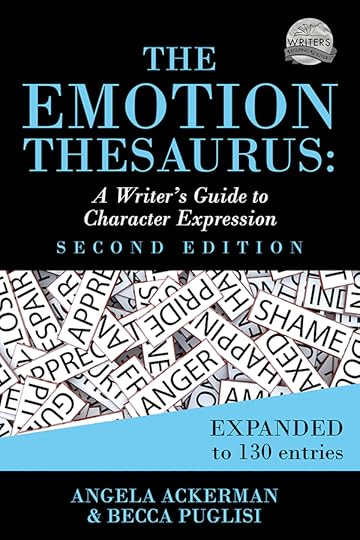
Element 4: Reactions ��� When done right, sharing how a character reacts or feels in their Point of View will have your reader laughing, crying, or sitting on the edge of their seat right along with your characters! The Emotion Thesaurus is an amazing resource to get your creative juices flowing and practice how to get these emotions and reactions on your page.
Element 5: Inner Thoughts ��� This one is the slam dunk element that will tip your readers over the edge, falling into your pages. Whether you have a narrator, or it���s written from a character���s Point of View (POV), they are your reader���s guide on the journey, and will let the reader know how to feel and react to the story as they go. Let this inner voice of your POV character(s) shine, giving meaning to the events that unfold in your book���s plot. This element is what gives your story personality, helping it stand out from the rest, so have fun with it.
What if the 5 Elements of Writing aren���t Balanced on Your Pages?��Have you ever read (or written!) a scene that feels a little flat, and you just can���t seem to put your finger on why? Chances are, the writer has leaned too heavily on 1-2 of these elements of writing for a page or more, without taking full advantage of the full range at their disposal. Reading passages like this feels more like a chore, and readers will disengage.
Some examples of the elements being out of balance are:
Including long paragraphs of setting description clumped together without anything happening in the scene. Readers can only digest so much information at once, and if you include too much (commonly referred to as an info dump), readers will start to skim to get back to the action on the page, missing all your beautiful descriptions.A page or more of quick back and forth dialogue, with minimal actions inserted between what each character is saying. This is a problem commonly called talking heads , where it feels like your characters are just heads blabbing back and forth, not providing any context. You can have quick exchanges, but keep these short and to the point for maximum impact.Long tirades in a character���s head (Inner Thoughts), while not moving the story forward. This one feels a lot like an info dump to read.Scenes that go from action to action, meticulously detailing the things your characters do, without giving them time to React, or reflect on what it means to them in that moment using Inner Thoughts.The good news is, this imbalance is easy to spot when reading your own drafts, and easy to fix. In addition to simply counting the number of elements you���ve used on each page using the list in this article, you can spot areas in your draft that need attention quickly, paying attention to the white space on the page.
A long section relying heavily on quick dialogue is easy to spot when there is lots of white space on your page.Too much setting description or inner thoughts is easy to spot when the text is dense on your pages, with long paragraphs and few breaksHaving awareness of the 5 Elements of Writing in your writers��� toolbelt will help you craft pages that hold your reader���s attention, making it feel three dimensional. Using 3 or more of these Elements on each page will keep your reader���s brain engaged and make your scenes feel richer and fuller, even better than the movie will be when it comes out.
The post Using the 5 Elements of Writing to Immerse Readers appeared first on WRITERS HELPING WRITERS��.
May 25, 2024
Character Type & Trope Thesaurus: Underdog
In 1959, Carl Jung first popularized the idea of archetypes���”universal images that have existed since the remotest times.” He posited that every person is a blend of these 12 basic personalities. Ever since then, authors have been applying this idea to fictional characters, combining the different archetypes to come up with interesting new versions. The result is a sizable pool of character tropes that we see from one story to another.
Archetypes and tropes are popular storytelling elements because of their familiarity. Upon seeing them, readers know immediately who they’re dealing with and what role the nerd, dark lord, femme fatale, or monster hunter will play. As authors, we need to recognize the commonalities for each trope so we can write them in a recognizable way and create a rudimentary sketch for any character we want to create.
But when it comes to characters, no one wants just a sketch; we want a vibrant and striking cast full of color, depth, and contrast. Diving deeper into character creation is especially important when starting with tropes because the blessing of their familiarity is also a curse; without differentiation, the characters begin to look the same from story to story.
But no more. The Character Type and Trope Thesaurus allows you to outline the foundational elements of each trope while also exploring how to individualize them. In this way, you’ll be able to use historically tried-and-true character types to create a cast for your story that is anything but traditional.
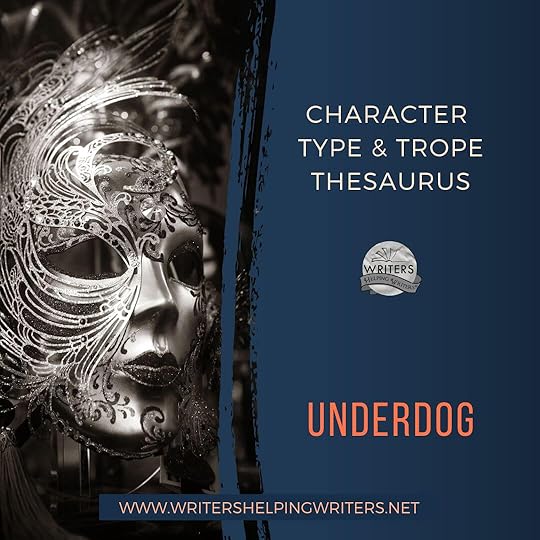
DESCRIPTION: At the start of the story, this competitor is woefully outmatched and has no chance of winning. They typically begin as a reluctant participant who eventually dedicates themselves wholeheartedly to coming out on top.
FICTIONAL EXAMPLES: Katniss Everdeen (The Hunger Games series), Frodo Baggins (The Lord of the Rings series), Maximus Decimus Meridius (Gladiator), Margaret ���Maggie��� Fitzgerald (Million Dollar Baby), Rocky Balboa (the Rocky franchise), Vince Papale (Invincible)
COMMON STRENGTHS: Adaptable, Alert, Ambitious, Appreciative, Cautious, Centered, Curious, Disciplined, Efficient, Empathetic, Focused, Honorable, Humble, Idealistic, Industrious, Inspirational, Just, Passionate, Patient, Persistent, Resourceful, Responsible, Simple, Spunky, Wise
COMMON WEAKNESSES: Apathetic, Gullible, Ignorant, Impulsive, Martyr, Nervous, Reckless, Resentful, Stubborn, Uncooperative, Vindictive, Withdrawn, Worrywart
ASSOCIATED ACTIONS, BEHAVIORS, AND TENDENCIES
Starting out at a disadvantage
Displaying determination and grit
Persevering when times are tough
Being resilient in the face of setbacks and opposition
Being humble and teachable
Adapting to new situations quickly
Keeping their eye on the prize
Making sacrifices to reach their goals
Seeing failure as an opportunity to learn
Using adversity to fuel their determination to win
SITUATIONS THAT WILL CHALLENGE THEM
Experiencing discrimination because of their race, gender, skill level, or social status
Lacking the necessary skills or tools to win and not knowing how to acquire them
Being asked to compromise their principals to gain an easy win
TWIST THIS TROPE WITH A CHARACTER WHO���
Isn���t an individual but is a group, people, or nation
Continually encounters morally ambiguous or impossible decisions on their journey
Has an atypical trait: Lazy, Spoiled, Ungrateful, Controlling, Confident, etc.
CLICH��S TO BE AWARE OF
A predictable plot line that ensures the underdog���s success
The rebel leader facing insurmountable odds who rallies support through rousing inspirational speeches and leads his followers to a quick victory
Other Type and Trope Thesaurus entries can be found here.
 Need More Descriptive Help?
Need More Descriptive Help?While this thesaurus is still being developed, the rest of our descriptive collection (16 unique thesauri and growing) is accessible through the One Stop for Writers THESAURUS database.
If you like, swing by and check out the video walkthrough for this site, and then give our Free Trial a spin.
The post Character Type & Trope Thesaurus: Underdog appeared first on WRITERS HELPING WRITERS��.
May 22, 2024
Phenomenal First Pages Contest

Hey, wonderful
writerly people!
It���s time for Phenomenal First Pages, our monthly critique contest. So, if you need a bit of help with your first page, today’s the day to enter for a chance to win professional feedback!
Entering is easy. All you need to do is leave your contact information on this entry form (or click the graphic below). If you are a winner, we’ll notify you and explain how to send us your first page.
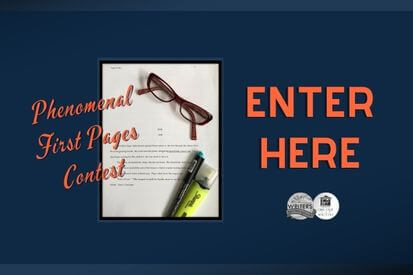 Contest DetailsThis is a 24-hour contest, so enter ASAP.Make sure your contact information on the
entry form
is correct. Three winners will be drawn. We will email you if you win and let you know how to submit your first page. Please have your first page ready in case your name is selected. Format it with 1-inch margins, double-spaced, and 12pt Times New Roman font. All genres are welcome except erotica.Sign Up for Notifications!
Contest DetailsThis is a 24-hour contest, so enter ASAP.Make sure your contact information on the
entry form
is correct. Three winners will be drawn. We will email you if you win and let you know how to submit your first page. Please have your first page ready in case your name is selected. Format it with 1-inch margins, double-spaced, and 12pt Times New Roman font. All genres are welcome except erotica.Sign Up for Notifications!If you���d like to be notified about our monthly Phenomenal First Pages contest, subscribe to blog notifications in this sidebar.
Good luck, everyone. We can’t wait to see who wins!
PS: To amp up your first page, grab our First Pages checklist from One Stop for Writers. For more help with story opening elements, visit this Mother Lode of First Page Resources.
The post Phenomenal First Pages Contest appeared first on WRITERS HELPING WRITERS��.
Writers Helping Writers
- Angela Ackerman's profile
- 1022 followers



